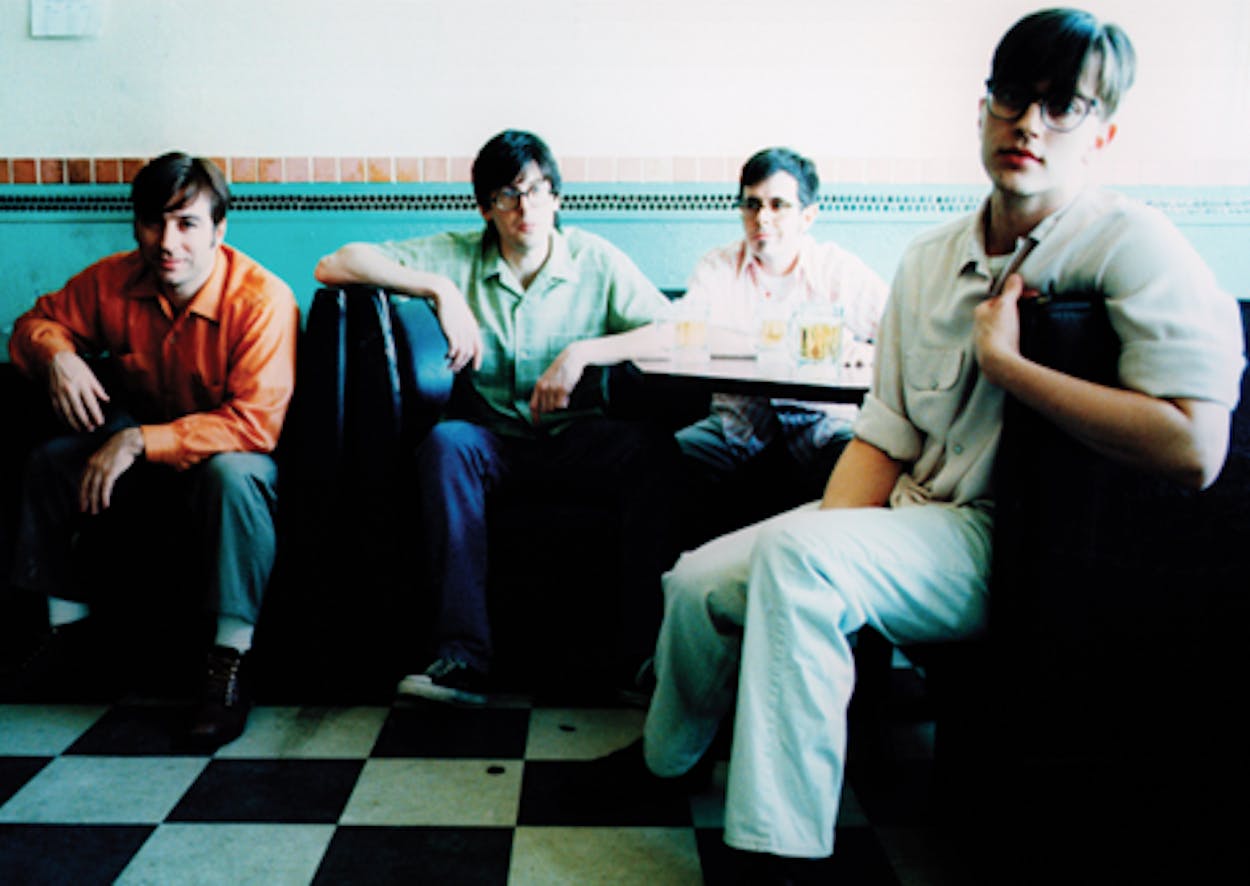In January 1997, Dallas’ Old 97’s were holed up in a studio just outside of Woodstock, N.Y., putting the finishing touches on what would be their major label debut, Too Far to Care.
Bandleader Rhett Miller said he wondered who would choose to live in such a cold, snowy place. He also vividly recalled the sleeping arrangements: in an adjacent schoolhouse-turned-loft, Miller was in the top bunk, drummer Philip Peeples in the bottom. Across a small hallway, guitarist Ken Bethea had the top bed above bassist Murry Hammond. Each night, they would listen to a playback of the tracks they had worked on before returning to their bunks. Nobody slept much.
“We’d lay there knowing we’d made the record we wanted to make,” Miller said. “And now I can really recognize what a special time that was. There were no limits. The possibilities were infinite. I could go anywhere, do anything, marry anyone. Who knew what was going to happen?”
Elektra Records released Too Far to Care in June 1997. To mark the set’s fifteenth anniversary, the band will perform the album in its entirety, followed by songs from the rest of their career, during a thirty-date tour that starts Aug. 23 in Houston. A remastered version of the album with bonus tracks will be released by the Los Angeles-based Omnivore Recordings label on Oct. 9.
Though the record sold modestly upon release, today it is widely recognized as a cornerstone of the “alternative country” movement, a subgenre that fused roots music with punk rock aesthetics. Too Far to Care leaned more toward The Clash than The Carter Family. As a collection of what were essentially country songs played fast, loud and jangly, the album was initially received as either a betrayal or a breakthrough. Rolling Stone dismissed it as “speed twang,” but others thought it proved there was still unchartered territory to mine from the alternative half of the alternative country equation. “It’s very rootsy, but it’s also loud and thick,” Hammond said. “We were playing with the parameters a little.”
The Old 97’s have made six studio albums since Too Far to Care and they still sell out large clubs and small theaters coast-to-coast. But even the band members agree that the record they made fifteen years ago is the one that best defines who they are.
“It’s the true sound of the Old 97’s,” Miller said.
Before Too Far to Care, the band released two well-received albums of country-leaning material peppered with just enough pep and twang to make them sweethearts of the small, but loudly passionate, alt. country faithful. By 1996, the movement had lots of buzz, but none of its standard bearers—Wilco, Son Volt and Whiskeytown—qualified as real stars. Which, to the major labels, made a quartet of young, real-deal Texans, alternatively good-looking and goofy, seem like potentially bankable next big things. By Miller’s count some fifteen major labels and imprints expressed interest in releasing the Old 97s’ third record, sparking a bidding war in which the band was flown coast to coast for meetings and enjoyed a seemingly endless series of thousand-dollar dinners.
“After the bidding war, our confidence was unbelievable,” Miller said. “And we sort of felt like, ‘O.K., we’ve graduated. Now we get to be whoever we really are.’ And after some self-reflection, we just wanted to be a big rock band. It wasn’t a problem that there was some twang in it. But we didn’t feel like we needed to play up the cow-poke elements of our band either.”
Initially, in a sign that they were swinging for the fences, Elektra and the band considered T-Bone Burnett and Don Was as producers. Was actually signed on, but backed out at the last minute to produce The Rolling Stones’ Bridges to Babylon. The nod eventually went to Wally Gagel, a producer who had built a career working with alternative rock acts like Sebadoh and Folk Implosion. Gagel’s idea was to capture the band’s live intensity and then craft something even bigger sounding by stacking guitar part upon guitar part. “It took us aback a little to hear it,” Hammond said. “We were like, ‘We’re a little loud, aren’t we?’”
That raucous sound would quickly become the band’s signature. The average Old 97’s setlist already includes almost half of Too Far to Care; they’re songs that hold up to time and songs their fans say they want to hear, Miller said. And they are why—even if it wasn’t a huge-selling record and didn’t spawn any hit singles—the band did not have to think twice about marking the album’s anniversary.
“Early on, and I don’t know if we believed it, we used to tell people we didn’t want hits, we wanted a career,” Miller said. “We didn’t want to chase some elusive radio thing. As it turned out, we didn’t have hits. We had a career. We got what we wished for. We’ve never had our moment in the sun. Maybe our so-called moment is twenty years of moments in the partial shade. That works for me.”







